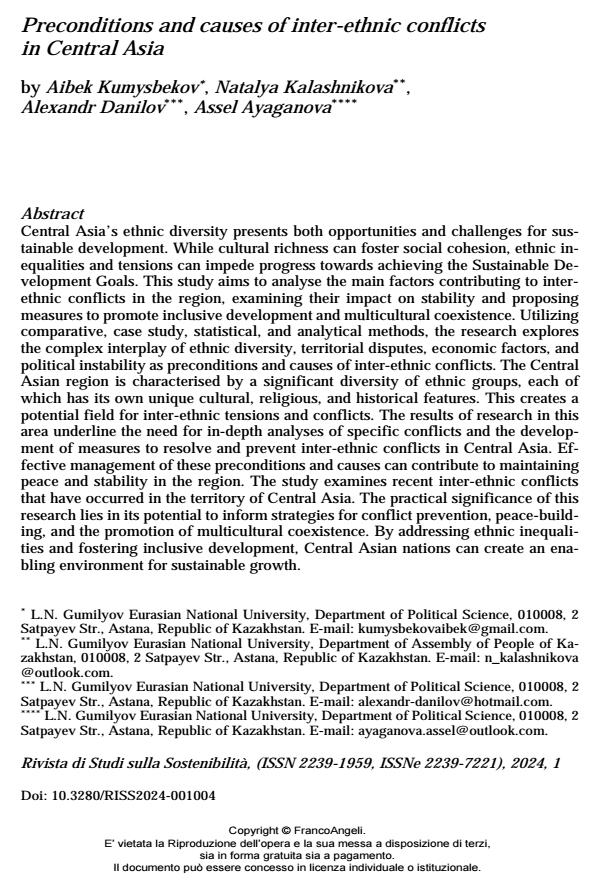Preconditions and causes of inter-ethnic conflicts in Central Asia
Journal title RIVISTA DI STUDI SULLA SOSTENIBILITA'
Author/s Aibek Kumysbekov, Natalya Kalashnikova, Alexandr Danilov, Assel Ayaganova
Publishing Year 2024 Issue 2024/1
Language English Pages 20 P. 45-64 File size 158 KB
DOI 10.3280/RISS2024-001004
DOI is like a bar code for intellectual property: to have more infomation
click here
Below, you can see the article first page
If you want to buy this article in PDF format, you can do it, following the instructions to buy download credits

FrancoAngeli is member of Publishers International Linking Association, Inc (PILA), a not-for-profit association which run the CrossRef service enabling links to and from online scholarly content.
Central Asia’s ethnic diversity presents both opportunities and challenges for sus-tainable development. While cultural richness can foster social cohesion, ethnic inequalities and tensions can impede progress towards achieving the Sustainable Development Goals. This study aims to analyse the main factors contributing to inter-ethnic conflicts in the region, examining their impact on stability and propos-ing measures to promote inclusive development and multicultural coexistence. Utilizing comparative, case study, statistical, and analytical methods, the research explores the complex interplay of ethnic diversity, territorial disputes, economic factors, and political instability as preconditions and causes of inter-ethnic con-flicts. The Central Asian region is characterised by a significant diversity of ethnic groups, each of which has its own unique cultural, religious, and historical features. This creates a potential field for inter-ethnic tensions and conflicts. The results of research in this area underline the need for in-depth analyses of specific conflicts and the development of measures to resolve and prevent inter-ethnic conflicts in Central Asia. Effective management of these preconditions and causes can con-tribute to maintaining peace and stability in the region. The study examines recent inter-ethnic conflicts that have occurred in the territory of Central Asia. The practi-cal significance of this research lies in its potential to inform strategies for conflict prevention, peace-building, and the promotion of multicultural coexistence. By addressing ethnic inequalities and fostering inclusive development, Central Asian nations can create an enabling environment for sustainable growth.
Keywords: identity, mediation, social inequality, territorial disputes, security, ethnic diversity.
Aibek Kumysbekov, Natalya Kalashnikova, Alexandr Danilov, Assel Ayaganova, Preconditions and causes of inter-ethnic conflicts in Central Asia in "RIVISTA DI STUDI SULLA SOSTENIBILITA'" 1/2024, pp 45-64, DOI: 10.3280/RISS2024-001004